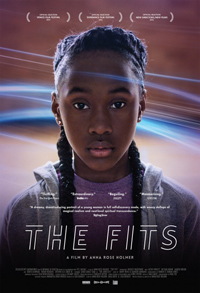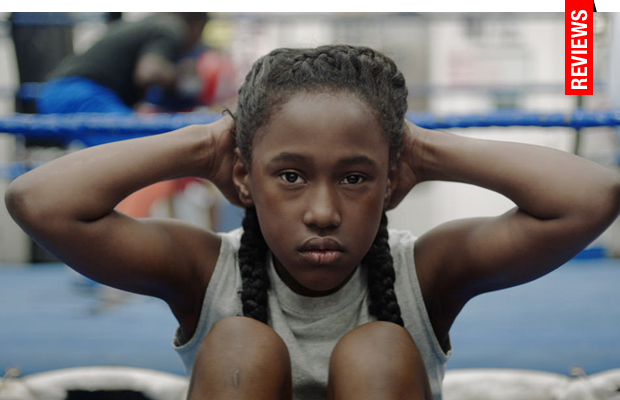Reviews
The Fits | Review
Get in Where You Fit In: Holmer’s Impressive Allegory of Assimilation
 Although it may feel a bit too allegorical or stylistically esoteric for its own good, Anna Rose Holmer’s impressive directorial debut The Fits is an inventive portrait of the inherent sacrifice of assimilation. Set in Cincinnati’s West End, an eleven-year-old tomboy trains as a boxer in a rec center with her older brother, only to discover an interest in joining an all-female dance drill team simultaneously practicing for their competitions. The more she observes these girls, many of whom are several years her senior, the more she desires to be just like them. But as she tries her hand at their craft, strange, unsettling fits, not unlike epileptic seizures, begin to plague members of the dance troupe. Simmering with unease and menace, Holmer expertly concocts a scenario of mass hysteria doubling as a metaphor for the inevitable initiation of a young girl into puberty (and all the bells and whistles specific to her assigned gender norms). As the title indicates, the cost of fitting in and the price paid to belong is perhaps all a matter of perspective.
Although it may feel a bit too allegorical or stylistically esoteric for its own good, Anna Rose Holmer’s impressive directorial debut The Fits is an inventive portrait of the inherent sacrifice of assimilation. Set in Cincinnati’s West End, an eleven-year-old tomboy trains as a boxer in a rec center with her older brother, only to discover an interest in joining an all-female dance drill team simultaneously practicing for their competitions. The more she observes these girls, many of whom are several years her senior, the more she desires to be just like them. But as she tries her hand at their craft, strange, unsettling fits, not unlike epileptic seizures, begin to plague members of the dance troupe. Simmering with unease and menace, Holmer expertly concocts a scenario of mass hysteria doubling as a metaphor for the inevitable initiation of a young girl into puberty (and all the bells and whistles specific to her assigned gender norms). As the title indicates, the cost of fitting in and the price paid to belong is perhaps all a matter of perspective.
The Fits premiered initially at the Venice Film Festival and Holmer’s debut, as has been noted, is a refreshing portrait of black youth not plagued by the general woes or assumed miserabilism accompanying narratives concerning minors where adults are relegated to the extreme periphery. Instead, Holmer, along with screenwriters Saela Davis and Lisa Kjerulff, crafts a philosophical exercise in the process of annihilating individuality and otherness for the greater good of the group. Tonie, as portrayed quite beautifully by newcomer Royalty Hightower, is introduced to us as coded for the male gender, idolizing her elder brother, even her name verbally ambiguous. Slowly, she becomes aware of her body and its placement in the environment around her. She pierces her ears to imitate the older girls who are envious of Tonie’s prepubescent waist size.
Clearly there’s a chasm Tonie has yet to cross before she becomes like the more exotic older girls, young women who’ve adopted titillating monikers like Legs (Makyla Burnam) and Karisma (Inayah Rodgers), signs of commodification. Tonie’s new nickname is Guns, an aggressive, masculine trait in response to her toned arms. But as Legs advises the junior girls in their training, they’ll soon begin behaving as a group in their off hours as well.
As the mysterious fits plague more and more of the older girls, each of them reacts differently to the experience, and from an outsider’s perspective this seems to be an exaggerated portrait of menstrual synchrony. This disturbing initiation into Tonie’s specifically coded social group, i.e. the young black woman, recalls similar depictions of metaphors for otherness, such as Carter Smith’s 2006 short film “Bug Crush,” Lucile Hadzhalilovic’s Innocence (2000) or on a more superficial level, something like Spike Lee’s School Daze (1988). The private universe of adolescents and their particular terminology also recalls the neo-noir stylings of Rian Johnson’s Brick (2005), at least as far as an exploration of a parallel reality adults are mostly unaware of.
The deliberately unnerving score from Danny Bensi and Saunder Jurriaans accounts for much of the mounting paranoia, but Holmer makes a deliberate change of pace in the final frames with an eloquent finale featuring a graceful Tonie after making it through the necessary hurdles. A melancholy tune croons about our “choice to be a slave to gravity” hinting at how we’re calibrated by our very nature to accept what we’re told and relent to unquestioned inevitability.
Like a caterpillar assuming the bright plumes of a butterfly’s wings following its metamorphosis, Tonie becomes part of a cluster of beautiful creatures, packaged in a tone which seems to justify such a transition. But what’s so unnerving about Holmer’s film is we’re not quite sure if she really is justifying the loss of Tonie’s distinct individuality, and thus creates a film both terrifying in its implications and aggravating for refusing to define its stance.
★★★½/☆☆☆☆☆
Reviewed on January 22nd at the 2016 Sundance Film Festival – NEXT Programme . 72 Min.
Los Angeles based Nicholas Bell is IONCINEMA.com's Chief Film Critic and covers film festivals such as Sundance, Berlin, Cannes and TIFF. He is part of the critic groups on Rotten Tomatoes, The Los Angeles Film Critics Association (LAFCA), the Online Film Critics Society (OFCS) and GALECA. His top 3 for 2021: France (Bruno Dumont), Passing (Rebecca Hall) and Nightmare Alley (Guillermo Del Toro). He was a jury member at the 2019 Cleveland International Film Festival.


































